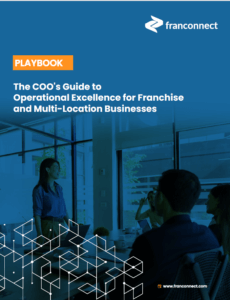Operational excellence is more than a business buzzword—it’s a strategic necessity for franchise and multi-location brands.
As the competitive landscape evolves, brands must deliver consistent customer value while optimizing resources, improving reliability, and driving growth. The chief operating officer (COO) is at the heart of this mission.
What Is Operational Excellence?
Operational excellence is the continuous pursuit of improved efficiency, reliability, and effectiveness across all facets of the business. While it has roots in manufacturing practices like Lean and Six Sigma—focused on reducing waste and improving quality—it has since evolved. Today, it’s a holistic framework that integrates people, processes, and technology to align operations with strategic goals.
For franchise and multi-location businesses, this means building systems that can scale without sacrificing consistency or quality.
The Evolving Role of the Modern COO
The role of the COO has changed dramatically over the past few years. No longer confined to managing daily operations, today’s COO is a strategic partner—driving innovation, aligning operational goals with broader business objectives, and navigating change in an increasingly complex environment.
To succeed, modern COOs must:
- Understand and act on real-time data and performance insights
- Lead cross-functional collaboration
- Leverage technology to improve visibility and accountability
- Drive operational strategies that scale
Their ability to translate vision into execution makes COOs indispensable in steering long-term brand success.
Tangible Impact on Operations
The COO’s influence is most clearly felt in the measurable improvements they drive in three core areas:
- Process Optimization: Identifying and eliminating inefficiencies across workflows.
- Resource Allocation: Ensuring the right people, tools, and capital are in place to support priorities.
- Team Alignment: Keeping everyone focused on the company’s strategic goals.
These actions lead to better productivity, lower costs, and stronger customer satisfaction—creating a clear operational advantage.
Balancing Innovation, Efficiency, and Cost
One of the toughest challenges COOs faces is balancing innovation with operational efficiency and cost control. These priorities can often be in tension: innovation demands investment, efficiency requires structure, and cost control can stifle both.
The solution lies in strategic prioritization. COOs must:
- Foster a culture of continuous improvement, encouraging small, incremental gains.
- Use data and KPIs to monitor progress and justify investments.
- Invest in technology and systems that offer both short-term ROI and long-term scalability.
When done right, this balance becomes a growth engine rather than a constraint.
Building a Culture of Continuous Improvement
Operational excellence isn’t a finish line—it’s a mindset. Successful COOs embed this culture into the organization by:
- Empowering teams and location managers to suggest and implement improvements.
- Encouraging collaboration to identify inefficiencies and spark innovation.
- Recognizing and rewarding initiatives that produce measurable results.
This cultural shift transforms operational excellence from a top-down initiative into a shared mission across the organization.
Why Operational Excellence Starts with the COO
The modern COO is no longer just an operational overseer—they’re a strategic driver of change and innovation. By fostering a culture of improvement and aligning daily execution with big-picture strategy, COOs help their brands stay competitive and agile.
As the demands on multi-location businesses continue to grow, COOs are uniquely positioned to bridge the gap between vision and execution. Their leadership is essential to turning ideas into action and ensuring operational excellence is not just achieved—but sustained.
Operational excellence is a broad concept, and many COOs still have questions about how to apply it effectively in today’s business environment. Understanding the difference between operational excellence and efficiency, knowing which KPIs to track, and leveraging the right technologies are all critical components. While operational excellence was once seen as a strategy for large enterprises, it’s now just as essential for emerging and mid-sized brands looking to scale with consistency and control. COOs who prioritize continuous improvement, data-driven decision-making, and aligned leadership are the ones best positioned to turn vision into sustained success.
Ready to take your operations to the next level?
Download the COO Playbook for Operational Excellence—your guide to proven strategies for driving efficiency, consistency, and scalable growth.











 Ian Walsh
Ian Walsh








